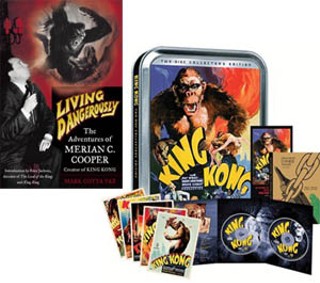Gift guide
By Josh Rosenblatt, Fri., Dec. 16, 2005

King Kong: Collector's Edition
Turner Home Entertainment, $39.98
Grass: A Nation's Battle for Life
Milestone, $29.95
Chang: A Drama of the Wilderness
Milestone, $29.95
Living Dangerously: The Adventures of Merian C. Cooper
by Mark Cotta Vaz
Villard, 496 pp., $26.95
On Wednesday, the world shook again with the weight of an angry, lovelorn 2000-pound great ape by the name of Kong. Director Peter Jackson has amassed all the latest in CGI technology, all the stars in the sky, and all the money in the world to delight and terrify audiences with one of the great epic stories in the history of cinema. And the box office will once again reel.Back in 1933, when the Great Depression was at its most depressing, original King Kong creator and director Merian C. Cooper didn't have special effects or computers or all the money money could buy. He had "trick work," stop-motion photography, an adventurous spirit, and some blind luck.
Just in time for the multimillion dollar media blitz that has trumpeted the remake, several DVD production companies and book publishers are jumping into the mix with tributes to the late Mr. Cooper. Last month, Turner released its exhaustive King Kong: Collector's Edition, complete with the requisite commentary tracks, documentaries, and profiles. Cooper's two earliest films – 1925's Grass and 1927's Chang – come to DVD courtesy of Milestone Films with fewer bells and whistles but almost as much cinematic significance. And to top it off, for every Cooper fan, there's Living Dangerously: The Adventures of Merian C. Cooper, author Mark Cotta Vaz's biography of the man behind the monster.
Merian Cooper was a man of adventure. Whether flying a fighter plane during World War I, trudging blithely through disease-infested jungles in Siam, or escaping from a Russian POW camp, Cooper was obsessed with the idea of the perilous life, and he was always at his most contented, strangely, when death was close at hand. For him, there was an immediacy to peril, far from the softening influence of civilization: "In the moment when life balances death," Cooper once wrote in his journal, "no matter how afraid you may be, you get a touch of the animal value of existence."

Cooper and his partner, war correspondent and cameraman Ernest B. Schoedsack, were true believers in the daring life and saw film as their "passport to adventure," not only a means to tell stories but also an opportunity to travel to exotic and far-flung locations on someone else's bill. To satisfy their danger-lust, the two born adventurers became filmmakers.
"Distant, difficult, and dangerous" was the motto of their little production partnership.
The first film they made together, the documentary Grass, follows the Bakhtiari tribe of Persia as they embark on a 48-day migration over unforgiving terrain in search of the life-giving verdant plains that lay on the other side of the sheer, snow-covered Zardeh Kuh mountains. The movie is an elemental epic of survival, of life at its most uncomplicated: Without grass, the Bakhtiari's animals will die; without their animals, the Bakhtiari will die; there is grass just over that mountain range.
The film is something of a mishmash, tonally, with fascinating episodes of native ritual and day-to-day tradition blending awkwardly with operatic intertitles. The young filmmakers weren't quite in control of the medium yet. But the footage of the tribe's migration across rivers and over mountains is some of the most powerful of early Hollywood. With the immersion of a cultural anthropologist's best writing, Cooper and Schoedsack tell the story of the Bakhtiari from the point of view of the tribe itself. There is no distance for the audience; we're right there riding goat-skin floats across that river, each one of us trudging shoeless up that frozen mountain pass.
Cooper and Schoedsack's second feature, Chang, took their interest in dangerous filmmaking and "natural dramas" into the realm of narrative. Deep in the wilds of Siam, a tribesman by the name of Kru moves his family (complete with a monkey, along for comic relief) outside the safe confines of the village and dares to set up a home deep in the "unconquerable jungle." The film's shots of pouncing tigers and stampeding elephants, Vaz assures us, were the real thing: The two foolhardy moviemakers put their lives on the line more than once to get the right shot. And more than one jungle cat went woefully into that good night after daring to take a step too many in the direction of the determined cameramen.
After the success of Grass and Chang, and the subsequent triumph of King Kong, Cooper remained married to the adventurous life and to the pictures. During World War II, he was a colonel with the Army Air Corps and chief of staff to General Claire Chenault, who called Cooper "a character straight from the Hollywood movies he once directed," brash and bold. In 1947, Cooper formed Argosy Pictures with screen legend John Ford and, during the next 20 years, produced some of the best movies to ever come out of Hollywood, including The Searchers and The Quiet Man.
Reportedly, in the final days before his death from cancer at the age of 80, Cooper, unworried, told his wife Dorothy that "death will be a new adventure." The story might be made up, but as Ford once said, you print the legend.








